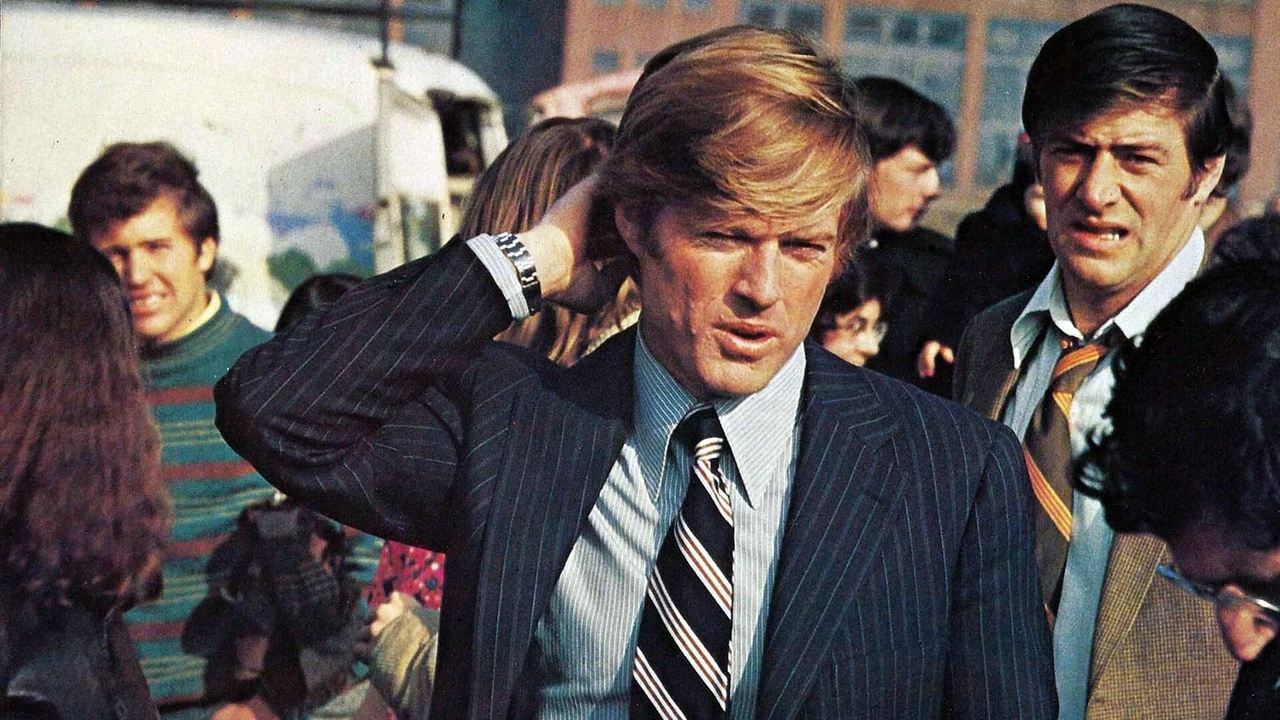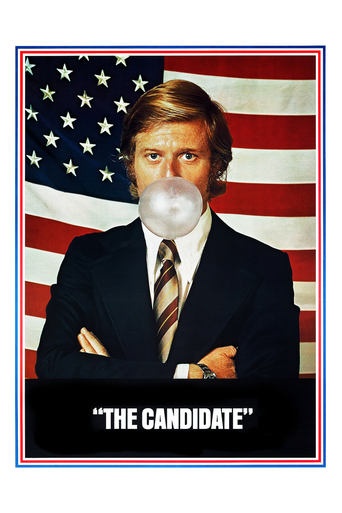

Michael Ritchie directed Robert Redford and Peter Boyle in his 1972 film, The Candidate. The Candidate follows Bill McKay, an everyman who was pushed into politics to dethrone the incumbent senator who many believe has turned his back on the people and is too interested in power. A film that looks a lot like real life, it is difficult to discern whether or not life has imitated art, or the opposite has taken place, either way, The Candidate is a familiar story and one that is a little difficult to visit given the current state of American politics. Bill McKay (Robert Redford) is a man who is more than happy to continue his quiet life submerged in his civil rights centered law practice. Bill has no interest in entering politics, as his father before him, former California Governor John J. McKay. Strategist Marvin Lucas (Peter Boyle) sees Bill as a unique opportunity, he sees the possibility of Bill entering a senate race against an incumbent Senator Crocker Jarmon (Don Porter) who has left his constituents disenfranchised as he seems to chase political power for his own gain. Marcus builds Bill's campaign using an interesting strategy; he has convinced Bill that he has no chance at beating the Senator, but will surely win his party's nomination, so, since he has no chance of winning, he can say whatever he wants and is free to shake up the political system on his way to defeat. The plans, however, go astray when the polls favor Bill much more than anyone ever anticipated.The message of The Candidate is one that becomes diluted the more familiar it becomes. There have been innumerable amounts of "everymen and everywomen" running for elected office and winning that The Candidate, as a pseudo-documentary style film has lost its effectiveness. Certainly, most notably, the election of Donald Trump in 2016, proves without a doubt, that anyone with no political experience can achieve even the highest office in the land. The Candidate "worked" much better at the time it was made, when career politicians were the only ones getting elected office. Robert Redford feels a bit miscast in the lead role that commands a relatable, emotion-filled performance. In many of his scenes, he comes off paper-thin, definitely lacking emotion. Peter Boyle, on the other hand, plays his hopeful, yet controlled reckless attitude incredibly well. Boyle is an actor in which I have never sought out, yet been constantly impressed with every time I've seen his performances. Overall, The Campaign is a good enough film, but one that I wish I could have seen some 30 years prior when it still carried the crux of its relevance.
... View MoreWHEN ONE VIEWS this film, it is obvious that the spin is definitely meant to favour the Left, Liberal or now called "Progressives." That is quite obvious as the starring figure is portrayed by Mr. Robert Redford, himself. The characterization of the incumbent Senator Jarmon (Don Porter) is further evidence of our contention.HOWEVWEE, HAVING JUST watched the movie on Turner Classic Movies, again after some years, we find that although there is this bias in evidence, they did do a good job in at least trying to maintain a high degree of neutrality in their portrayals. It appears that it is all too easy to dismiss this as being so one-sided toward the Left, rather than looking just a little bit deeper into the true nature of the story.THE STORYLINE, SUCH as it is, follows the path that the young and otherwise naive son of a former California takes in becoming a candidate for the Senate. Bill McKay (Redford) at first begins his campaign as a sort of means of making a point about the present state of conditions in the USA. As he gets deeper into the run, he becomes influenced by the professional political operations of his campaign manager, Marvin Lucas(Peter Boyle), being supported by a fine collection of supporting players (Michael Lerner, Allen Garfield, Quinn Redeker, Morgan Upton, Kenneth Tobey and others). GIVING WHAT MUST be described as a feeling and look of realism to the production is the inclusion of so many people from the entertainment world and its great subsidiary, the news people. There are also included the cameo appearances by real, true life political figures such as Hubert Humphrey and George McGovern.IT IS ONLY at Film's end, when with McKay's ultimate victory in the General Election, do we realize what the true meaning of the story really is. And that would be: that the with American tradition of having our candidates vetted by the people, as interpreted by our press, it becomes much more a matter of show Biz, rather than a free exchange and debate of issues,. ideas and political principles.AND THIS IS a powerful force that will transform people who seek office, whether they want it or not.NOTE: Bill McKay's final fade out question to his campaign manager of "Marvin, what do I do now?" would appear to be a real, true slice of life. Years later, in 1979, a news camera caught the new Mayor-Elect of Chicago, Jane Byrne, asking the same question of an aid after addressing the press boys on her victorious election night.
... View MorePolitical operative Marvin Lucas (Peter Boyle) is looking for a Democratic candidate to oppose popular Republican U.S. Senator Crocker Jarmon in California. He convinces idealistic do-gooder lawyer Bill McKay (Robert Redford) to enter the race in an unwinable race. He offers him an opportunity to say whatever he wants. McKay is the son of former governor John J. McKay (Melvyn Douglas) and becomes the nominee. His campaign is being crushed by the Jarmon machine and he tries to water down his message. He struggles between the same politics as usual and his convictions as the race tightens.The Watergate break-in happened and nobody cared. The public still has some blind naivety about the world of politics at the time. This movie skewers it with a bit of humor and lots of insight. The shooting style is slightly documentary style. Redford and Boyle are terrific. The writing digs deep and wins the Oscar. It's a great movie about the real political world.
... View More"The Candidate" is a film which has something in common with Sidney Lumet's "Power" from the following decade. Both films look at the role played by political consultants, what would today be called "spin doctors", in the American electoral process, and both were made at a time when there was a popular conservative Republican in the White House, Nixon in 1972 and Reagan in the eighties. (Prior to the Watergate scandal, Nixon was highly popular, as indicated by his landslide win in that year's Presidential election). One difference between the films is that in "Power" more attention is paid to the personality of the spin doctor, whereas here it is the candidate himself who is at the centre. The film tells the story of a campaign for a Senate seat in California, currently held by another popular conservative Republican, Senator Crocker Jarmon. The Democratic candidate is Bill McKay, an idealistic, charismatic and politically liberal lawyer. Much of the film deals with the relationship between McKay and his spin doctor Marvin Lucas, who endeavours to persuade McKay to tone down his radical rhetoric, especially on controversial issues like abortion and school bussing, and to make himself a bland, centrist candidate, all things to all men. The script was written by Jeremy Larner, who had been a speechwriter for the liberal Senator Eugene McCarthy during the 1968 Presidential election campaign, so was presumably made with a liberal agenda in mind. It seems, however, to have ended up as one of those films which were ostensibly made from a liberal standpoint but which are just as capable of being interpreted in a conservative, or at least a centrist, fashion. (Others that come to mind include "High Noon" and "Seven Days in May"). Larner may have intended an indictment of the way in which the US political system discourages genuinely radical debate of issues such as poverty and race relations. The storyline, however, in which McKay comes back from a seemingly hopeless position to win the race, could also be interpreted as a warning that the Democrats must abandon radicalism and seek out the centre ground if they are to win elections. (If that was indeed the film's message, it was sadly lost on George McGovern, their candidate for President that year). Of course, Larner had put himself in a difficult position; had he written an ending in which Jarmon won the election, some might have seen this as an endorsement of conservative Republicanism. The film is made in a rather dry, semi-documentary style, concentrating more on political debate than on personal issues. There is a suggestion that McKay, a married man, may be having an affair with another woman, but this issue is given far less prominence that it would be in most political dramas. The personal relationship which is given most prominence is the rather difficult one between McKay and his more conservative father John, a former State Governor, who is initially reluctant to endorse his son's campaign. McKay is played by Robert Redford, one of Hollywood's most prominent liberals and a huge star in the seventies, but he cannot do much with the role; McKay comes across as little more than a handsome, charismatic mouthpiece for a set of ideas, some of which are not really even his own. Peter Boyle as Lucas and Don Porter as Jarmon are rather better, but to my mind this is a film which never really comes to life. Some of the issues have a certain modern resonance; many of Jarmon's speeches, for example, would go down well with the current "Tea Party" movement. Overall, however, my impression was that, while "The Candidate" may have been controversial in 1972, today is just comes across as a dull debate about the politics of forty years ago. "Power" has its faults, but it has held up rather better as an examination of the role of the spin doctor. 5/10
... View More